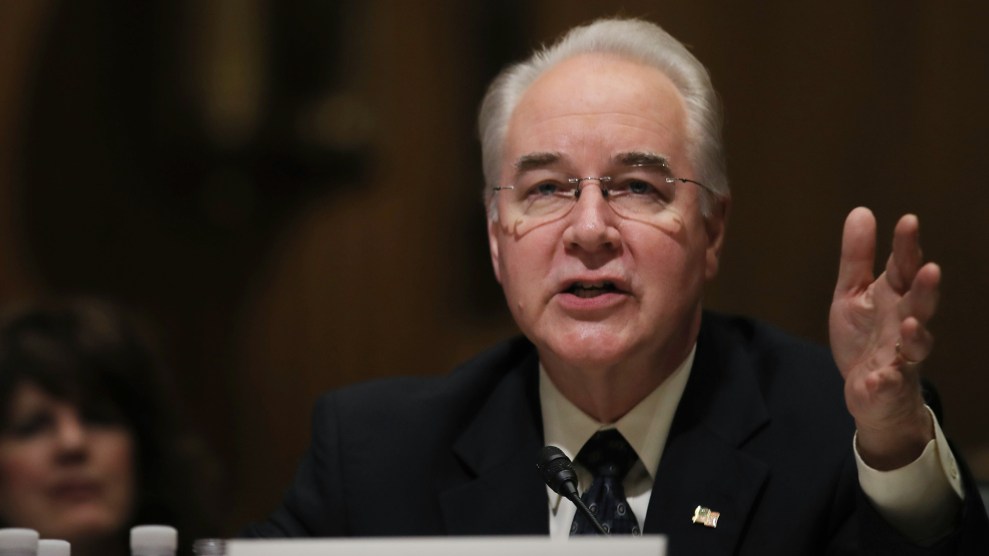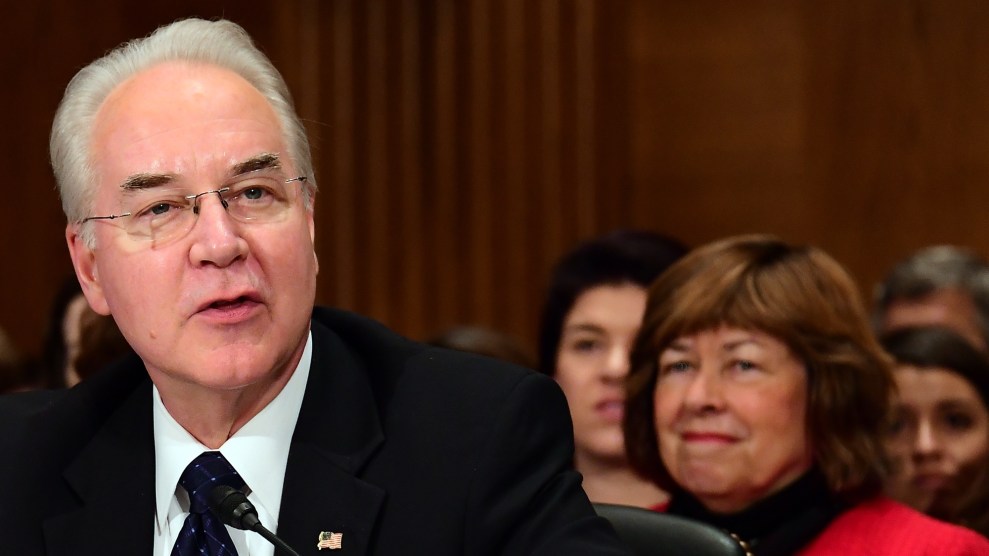The man Donald Trump has chosen to direct health policy for the federal government has close ties to the tobacco industry he will be charged with regulating. Rep. Tom Price (R-Ga.), who was confirmed as health and human services secretary by a 52-47 vote in the Senate early Friday morning, has repeatedly voted against bills that could harm big tobacco. At the same time, he’s received thousands of dollars in political contributions from the industry and held investments in tobacco companies—investments he says he didn’t know about.
Early in Barack Obama’s presidency, Congress renewed the State Children’s Health Insurance Program. In order to pay for the program, lawmakers raised cigarette taxes by 62 cents per pack and cigar taxes by 40 cents per cigar. Price blasted the new fees. “Today’s tax hike serves as a useful reminder that the president is comfortable raising taxes on hard-working Americans to feed his reckless agenda,” Price said in an April 2009 statement. “President Obama has done nothing to demonstrate that he is a responsible steward of taxpayer money. Yet, he is forcing the American people to burn through even more of their income in the name of more government.”
A few months later, Congress passed the Family Smoking Prevention and Tobacco Control Act, which empowered the Food and Drug Administration to regulate tobacco products. (The Supreme Court had ruled in 2000 that the FDA did not have that authority under existing law.) The legislation has enabled the agency to ban certain flavored cigarettes that might entice young people to begin smoking. It also allows the FDA to require additional warnings on packages.
Price joined most Republicans in voting against the FDA legislation. But thanks to that bill, as health secretary, he will now have immense influence over how the tobacco industry operates. (The FDA is part of the Department of Health and Human Services.) In 2011, the Obama administration proposed adding graphic warning labels—including images of diseased mouths and lungs—to the top half of cigarette packs. After a drawn-out legal battle, the courts ultimately upheld the FDA’s ability to regulate tobacco packaging but struck down that specific version of the rule.* Following several years of inaction by the administration, a collection of medical and public health groups, including the American Cancer Society, sued the government last fall in an attempt to force it to finalize the new label requirements. Once he’s in place at HHS, Price can ask the FDA to move forward with the new rules, weaken them, or abandon them altogether.
The conservative website Hot Air celebrated the latter possibility when Price’s nomination was announced in November. “Fortunately for all of us, most of the sore spots on the HHS and FDA regulatory front don’t require cooperation from Congress or the courts,” the site said, pointing to regulations on cigars and electronic cigarettes. “These are things which can essentially be tidied up with a stroke of the pen once Trump and Price are in office.”
Price has benefited from numerous tobacco industry donations during his political career. Back when he was a state legislator in Georgia in 1998, Philip Morris gave Price’s campaign $300. More recently, the PAC for Altria Group, parent company to Philip Morris, donated $18,000 to Price’s congressional campaigns. From 2008 to 2012, Price also received $19,000 from the PAC of RJ Reynolds, the company behind Camel and other cigarette brands.
Price’s office did not respond to a request for comment.
Sen. Al Franken (D-Minn) raised concerns about Price’s personal investments in tobacco companies during his confirmation hearing last month. According to Price’s financial disclosure forms, he sold off 768 shares in Altria and Philip Morris International for $37,000 in 2012. (Altria owns the American Phillip Morris brand. Phillip Morris International has been a separate company since 2008.) Franken started by asking Price to identify the “leading cause of preventable death” and then informed him that it was smoking.
“That hits home,” Price replied. “I lost my dad, who was a Lucky Strike smoker from World War II, to emphysema. He prided himself on the fact that he never smoked a cigarette with a filter for years and years.”
Franken expressed surprise that Price, a physician, would invest in products that lead to the deaths of about 480,000 people in the country each year. “Congressman Price, you’re a physician, which means you took the Hippocratic oath, a pledge to do no harm,” Franken said. “How do you square reaping personal financial gain from the sales of an addictive product that kills millions of Americans every decade with also voting against measures to reduce the death toll inflicted by tobacco?”
“It’s a curious observation,” Price responded, claiming that he had “no idea” about the stocks he owned; he suggested that they were purchased by a mutual fund or pension plan he had invested in. The tobacco investments were publicly disclosed in his financial report, and at other points in his hearing he acknowledged that he had the ability to direct his stock broker on other investments he held.
“I find it very hard to believe that you did not know that you had tobacco stocks,” Franken responded.
Watch the full exchange above.
The description of legal decisions on the FDA’s rule has been corrected. The story has also been updated following Price’s confirmation.
















